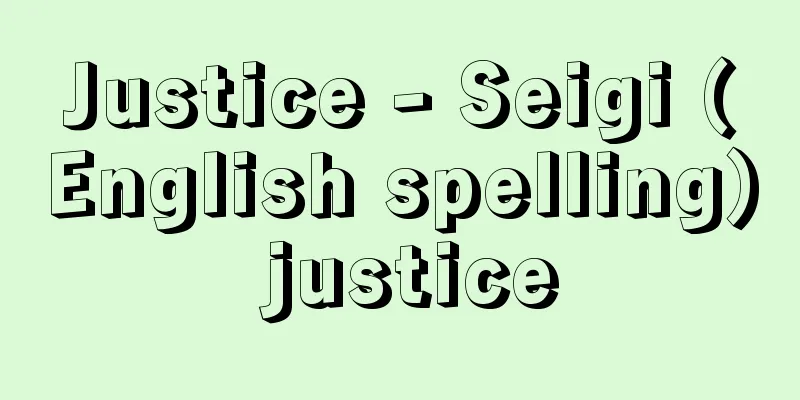Justice - Seigi (English spelling) justice

|
Since ancient Greece and Rome, justice has been commonly expressed by the simple motto "to each his share." In other words, justice means giving each person what he deserves, but it can also be "distributive justice," in which each person is given his due share, or "retributive justice," in which a person receives his due reward for what he has done. While Thrasymachus, a member of the ancient Greek Sophists, defined justice as "the interest of the strong," Plato made a clear distinction between "power" and "right," and made "justice" the supreme virtue that a state should possess. Aristotle divided justice into "distributive justice" and "retributive justice," which had a great influence on later theories of justice. The Latin word for justice and related Western words contain the word jus Recht, or "law." Therefore, issues of justice have been considered to be deeply related to issues of law. Moreover, "law" in this case is not limited to actual positive law (written law and unwritten law), but also relates to divine law and natural law, so issues of justice have traditionally been widely discussed in ethics, legal philosophy, jurisprudence, political philosophy, and so on. Justice is considered the standard for nations and social systems, and may be embodied in law, or conversely, it may be a principle for criticizing bad laws. By the way, justice has been discussed in various ways, specifically as a matter of equality. In law, it is used as a principle to make up for the deficiencies of common law, especially as a matter of "equity." Recently, the issue of justice, especially in the form of "social justice," has attracted attention as a humanitarian and universal challenge that denounces various problems in the modern world, such as the gap between rich and poor, socio-economic exploitation and inequality, discrimination, human rights violations, political oppression, and military and violent conflict and confrontation, and calls for their resolution. [Yoshiaki Iizaka] [Reference] |Source: Shogakukan Encyclopedia Nipponica About Encyclopedia Nipponica Information | Legend |
|
正義は、古代ギリシア・ローマ時代以来、「各人に各人の分を」suumcuiqueという簡潔な標語で一般に言い表されてきた。つまり、その人に相応するものをその人に帰属させることが正義であるとされるが、その人の当然の取り分をその人に与えるという「分配の正義」である場合もあれば、その人のなしたことに対して当然の報いを受けるという「応報の正義」である場合もある。古代ギリシアのソフィスト派に属するトラシマコスが、正義を「強者の利益」と規定したのに対して、プラトンは「権力」と「権利」との区別を明確にして、「正義」を国家の備えるべき至高の徳とした。アリストテレスは正義を「配分的正義」と「応報的正義」に分け、後の正義論に大きな影響を与えた。 正義というラテン語、およびそれと関連する西欧語には、「法」あるいは「権利」jus Rechtという語が含まれている。したがって正義の問題は、法の問題と深い関係をもつものと考えられてきた。しかもこの場合の「法」は、現実の実定法(成文法、不文法)に限らず、神法、自然法にも関係するから、正義の問題は、倫理学、法哲学、法学、政治哲学などにおいて従来広く論ぜられてきた。正義は国家や社会制度の基準とされ、法において体現される場合もあれば、逆に悪法を批判する原理ともなりうるのである。 ところで、正義に関する議論は、具体的には平等の問題としていろいろと論ぜられてきた。また法律上は、とくに「衡平(法)」equityの問題としてコモン・ロー(慣習法)の不備を補う原則として用いられている。 最近では正義の問題は、とくに「社会正義」social justiceという形で、現代世界における貧富の格差と社会経済的搾取や不平等、差別や人権侵害、政治的抑圧や軍事的暴力的対立と抗争などの諸問題を告発し、その解決を求める人道的人類的課題を呈示するものとして注目されている。 [飯坂良明] [参照項目] |出典 小学館 日本大百科全書(ニッポニカ)日本大百科全書(ニッポニカ)について 情報 | 凡例 |
Recommend
Gavia adamsii (English spelling) Gaviaadamsii
…[Hiroshi Hasegawa]. … *Some of the terminology t...
Cantonese - Kantongo
A dialect of Chinese. In addition to Guangdong Pro...
Kasul-i-Sireen - Kasul-i-Sireen
…The front part of the building is a public area ...
Kamikawachi [town] - Kamikawachi
A former town in Kawachi County in central Tochigi...
《Nobunaga of Christianity》
...In modern times (after the lifting of the ban ...
Great Yarmouth
A port city on the east coast of Norfolk, eastern ...
Pterois volitans (English spelling) Pteroisvolitans
...As it grows, the front half of its body turns ...
Amritsar (English spelling)
The largest city in the northwestern state of Punj...
Gold, T. (English spelling) GoldT
…In the late 1940s, the value of the Hubble const...
Leucosceprrum stellipilum (English spelling) Leucosceprrumstellipilum
…[Murata Gen]. … *Some of the terminology that me...
Lavandura angustifolia (English spelling) Lavandura angustifolia
...A semi-woody plant of the Lamiaceae family fam...
Cnidocytes
Microscopic structures present in individuals of ...
Adele, C. - Adele
…This was the path to perfection that researchers...
Deguchi Onisaburo - Deguchi Onisaburo
Religious leader. Omoto monk. Former name Ueda Ki...
α,α-Dichlorotoluene - α,α-dichlorotoluene
…It is also called benzylidene chloride, α, α'...
![Tajima [town] - Tajima](/upload/images/67cc20e5c5b81.webp)








![Universal [company] - Universal](/upload/images/67cd149b4b387.webp)